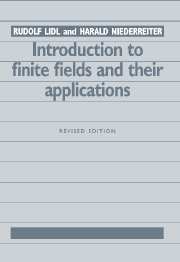Book contents
- Frontmatter
- Contents
- Preface
- Preface to the revised edition
- Chapter 1 Algebraic Foundations
- Chapter 2 Structure of Finite Fields
- Chapter 3 Polynomials over Finite Fields
- Chapter 4 Factorization of Polynomials
- Chapter 5 Exponential Sums
- Chapter 6 Linear Recurring Sequences
- Chapter 7 Theoretical Applications of Finite Fields
- Chapter 8 Algebraic Coding Theory
- Chapter 9 Cryptology
- Chapter 10 Tables
- Bibliography
- List of Symbols
- Index
Chapter 7 - Theoretical Applications of Finite Fields
Published online by Cambridge University Press: 05 June 2012
- Frontmatter
- Contents
- Preface
- Preface to the revised edition
- Chapter 1 Algebraic Foundations
- Chapter 2 Structure of Finite Fields
- Chapter 3 Polynomials over Finite Fields
- Chapter 4 Factorization of Polynomials
- Chapter 5 Exponential Sums
- Chapter 6 Linear Recurring Sequences
- Chapter 7 Theoretical Applications of Finite Fields
- Chapter 8 Algebraic Coding Theory
- Chapter 9 Cryptology
- Chapter 10 Tables
- Bibliography
- List of Symbols
- Index
Summary
Finite fields play a fundamental role in some of the most fascinating applications of modern algebra to the real world. These applications occur in the general area of data communication, a vital concern in our information society. Technological breakthroughs like space and satellite communications and mundane matters like guarding the privacy of information in data banks all depend in one way or another on the use of finite fields. Because of the importance of these applications to communication and information theory, we will present them in greater detail in the following chapters. Chapter 8 discusses applications of finite fields to coding theory, the science of reliable transmission of messages, and Chapter 9 deals with applications to cryptology, the art of enciphering and deciphering secret messages.
This chapter is devoted to applications of finite fields within mathematics. These applications are indeed numerous, so we can only offer a selection of possible topics. Section 1 contains some results on the use of finite fields in affine and projective geometry and illustrates in particular their role in the construction of projective planes with a finite number of points and lines. Section 2 on combinatorics demonstrates the variety of applications of finite fields to this subject and points out their usefulness in problems of design of statistical experiments.
In Section 3 we give the definition of a linear modular system and show how finite fields are involved in this theory.
- Type
- Chapter
- Information
- Introduction to Finite Fields and their Applications , pp. 256 - 304Publisher: Cambridge University PressPrint publication year: 1994
- 1
- Cited by



